Daily Vocabulary Words: List of Daily Used Words in Leading International Newspapers
Hi there. Welcome to this special section @ Wordpandit.
Our endeavour here is very simple: to highlight important daily vocabulary words, which you would come across in leading newspapers in the country. We have included the following newspapers in our selection:
• The New York Times
• The Washington Post
• Scientific American
• BBC
• The Guardian
• Psychology Today
• Wall Street Journal
• The Economist
We are putting in extensive work for developing your vocabulary. All you have got to do is be regular with this section and check out this post on a daily basis. This is your repository of words that are commonly used and essentially, we are posting a list of daily used words. Hence, this has significant practical application as it teaches you words that are used commonly in leading publications mentioned above.
Visit the website daily to learn words from leading international newspapers.
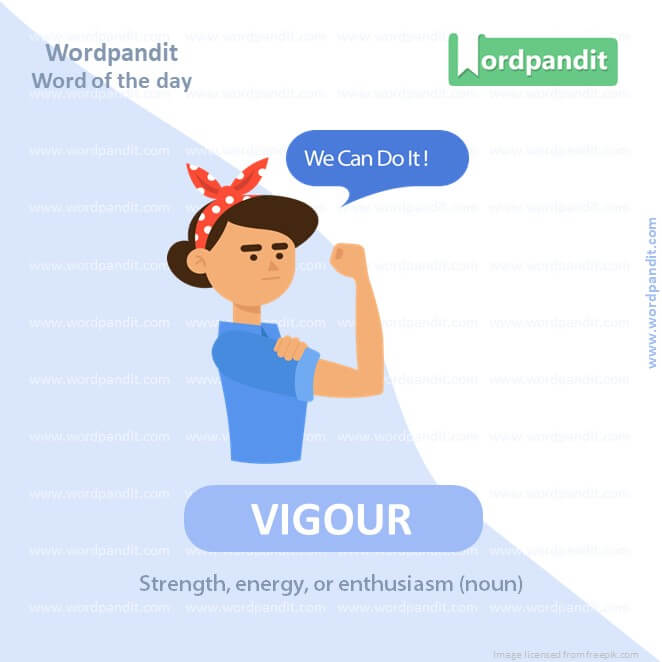
WORD-1: VIGOUR
CONTEXT: Trump has a presence and vigour, an ability to project himself, that Biden does not.
SOURCE: The Guardian
EXPLANATORY PARAGRAPH: Vigour is like the strong energy and excitement you feel when you’re super excited about something. Imagine you just got a new toy, and you’re jumping around with joy and showing it off to everyone. That energy and enthusiasm you have is what vigour means.
MEANING: Strength, energy, or enthusiasm. (noun)
PRONUNCIATION: VIH-gur
SYNONYMS: Vitality, energy, force, power, strength, zest, dynamism
USAGE EXAMPLES:
1. She sang the song with great vigour.
2. His vigour and passion for the project impressed everyone.
3. With age, he lost some of his youthful vigour.
4. The plant grew with surprising vigour.
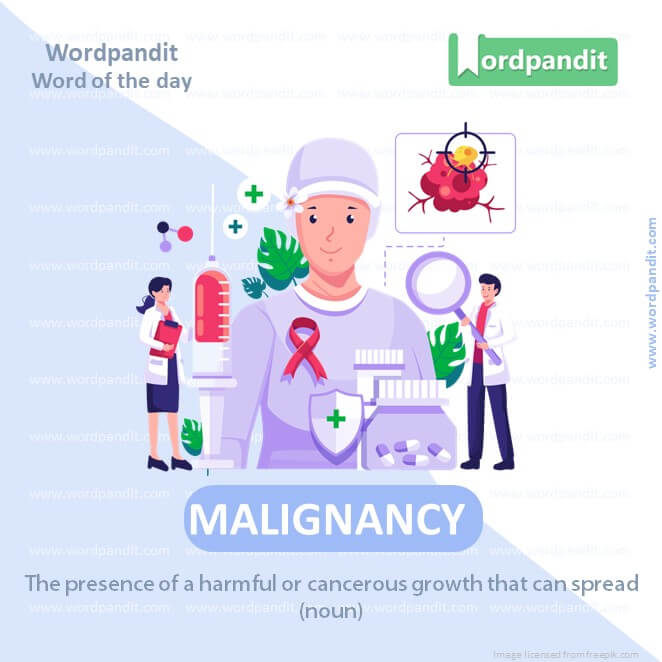
WORD-2: MALIGNANCY
CONTEXT: The challenge for Democrats is to use the 14 months between now and election day to get past that, to point out the malignancy of Trump and the danger a second Trump presidency would represent to the republic and the world – and also to make the positive case for what we might call Bidenism.
SOURCE: The Guardian
EXPLANATORY PARAGRAPH: Malignancy is a word that doctors use when someone has a kind of sickness that’s really harmful and can spread inside their body. It’s like when you have a naughty toy that keeps causing trouble and doesn’t stop.
MEANING: The presence of a harmful or cancerous growth that can spread. (noun)
PRONUNCIATION: muh-LIG-nuhn-see
SYNONYMS: Cancer, tumor, growth, carcinoma, sarcoma, neoplasm, lesion
USAGE EXAMPLES:
1. The biopsy revealed the presence of malignancy.
2. Early detection can help treat malignancy.
3. She was diagnosed with skin malignancy.
4. The doctors are researching new treatments for malignancy.
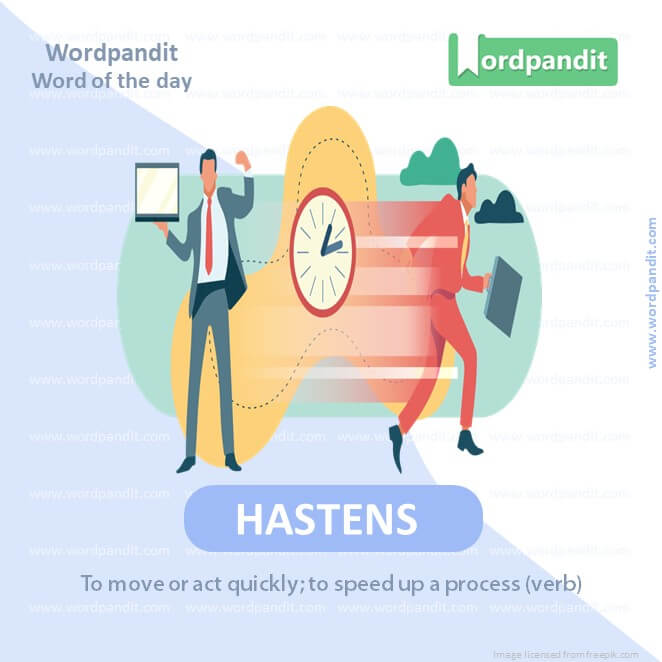
WORD-3: HASTENS
CONTEXT: First, it hastens the day the US makes the break from fossil fuels – by making clean energy not only the morally superior option for both industry and consumers, but the financially superior one too.
SOURCE: The Guardian
EXPLANATORY PARAGRAPH: ‘Hastens’ means to go really fast or to make something happen sooner. Like when you’re running super fast because you can’t wait to get to the playground!
MEANING: To move or act quickly; to speed up a process. (verb)
PRONUNCIATION: HAY-senz
SYNONYMS: Hurries, speeds, rushes, accelerates, quickens, dashes, sprints
USAGE EXAMPLES:
1. She hastens to finish her homework.
2. The rain hastens the growth of the plants.
3. He always hastens to help those in need.
4. The news hastens their departure from the city.
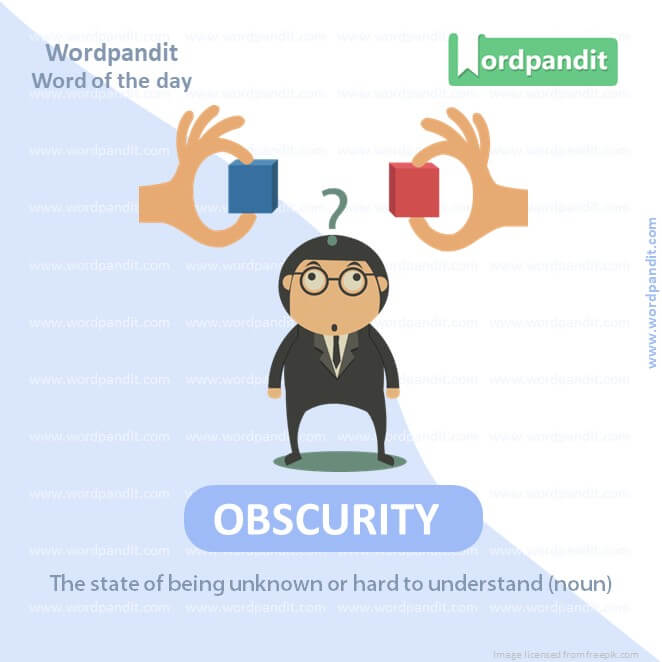
WORD-4: OBSCURITY
CONTEXT: It must be galling for the former Republican “it girl”– who was plucked from obscurity and thrust into the ego-swelling limelight as John McCain’s running mate in 2008 – to watch from afar as the diabolical duo of Marjorie Taylor Greene and Lauren Boebert slowly and inevitably overtook her in the calcified hearts and conspiracy-consumed minds of the party’s looney tunes faithful.
SOURCE: Al Jazeera
EXPLANATORY PARAGRAPH: Obscurity is like when something is hidden or not well-known. Imagine having a secret hideout that no one knows about, that hideout would be in obscurity.
MEANING: The state of being unknown or hard to understand. (noun)
PRONUNCIATION: ob-SKYOO-ri-tee
SYNONYMS: Darkness, vagueness, ambiguity, unclearness, uncertainty, shadow, mystery
USAGE EXAMPLES:
1. The artist rose from obscurity to fame.
2. The details of the event remain in obscurity.
3. The town was in obscurity until they found oil there.
4. She chose to live her life in obscurity.
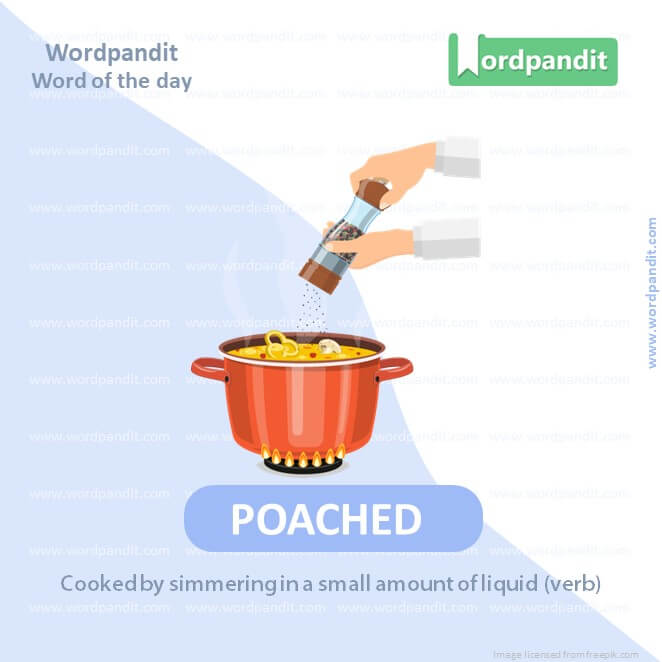
WORD-5: POACHED
CONTEXT: The global illegal wildlife trade is largely facilitated by organised criminal networks. For instance, pangolins are poached extensively in Asia and Africa to meet the demand arising from China.
SOURCE: Al Jazeera
EXPLAN
ATORY PARAGRAPH: ‘Poached’ is a way to cook something, like an egg, by gently boiling it in water. But ‘poached’ can also mean when someone takes animals from a place without permission, like stealing a bird from a forest.
MEANING:
1. Cooked by simmering in a small amount of liquid. (verb)
2. Illegally hunted or captured. (verb)
PRONUNCIATION: pohtched
SYNONYMS: Simmered, steamed, boiled, illicitly hunted, illegally taken, snared, captured
USAGE EXAMPLES:
1. She ordered poached eggs for breakfast.
2. The eggs were perfectly poached.
3. The rare birds were poached from the reserve.
4. Poaching wildlife is a serious crime.
WORD-6: ABSTINENCE
CONTEXT: Nevertheless, Donelan’s demands that tech companies cut off access to their tools for under-13s are the equivalent of the misguided practice of abstinence-only teaching in sex education classes at school: you can pretend kids aren’t doing it, but they will anyway.
SOURCE: The Guardian
EXPLANATORY PARAGRAPH: Abstinence is like when you decide not to eat your favourite candy even if it’s in front of you, because you think it’s better for you not to have it. It’s choosing not to do something even if you want to.
MEANING: The act of refraining or not doing something, especially something considered bad. (noun)
PRONUNCIATION: AB-stuh-nence
SYNONYMS: Restraint, self-control, avoidance, temperance, self-denial, refraining, teetotalism
USAGE EXAMPLES:
1. He practiced abstinence from sugary drinks.
2. Abstinence from smoking benefits health.
3. Some people choose abstinence during certain religious periods.
4. She promoted abstinence as a healthy choice.
WORD-7: PUNITIVELY
CONTEXT: If you make it punitively expensive for companies to acknowledge that underage users might be on their platform, they will do their level best to prevent children from accessing it.
SOURCE: The Guardian
EXPLANATORY PARAGRAPH: ‘Punitively’ means in a way that’s like giving someone a timeout because they did something wrong. If your friend does something naughty and you decide not to share your toys with them as a punishment, you’re acting punitively.
MEANING: In a manner that punishes or is meant to punish. (adverb)
PRONUNCIATION: PYOO-ni-tiv-lee
SYNONYMS: Penally, retributively, vengefully, disciplinarily, chasteningly, correctively, punishingly
USAGE EXAMPLES:
1. The law punitively addresses those who break it.
2. He was punitively fined for his actions.
3. They acted punitively after the betrayal.
4. The taxes were raised punitively on luxury goods.
WORD-8: CAVERNOUS
CONTEXT: It’s eclectic, so add BB King, and this year add Stormzy. He is on the main stage – he’s massive everywhere. Ezra are on a smaller stage, but still it’s cavernous.
SOURCE: The Guardian
EXPLANATORY PARAGRAPH: ‘Cavernous’ means something really big and hollow inside, like a huge cave you can explore. Imagine a big room where your voice echoes because it’s so empty and spacious; that’s cavernous!
MEANING: Being deep-set, spacious and resembling a cave. (adjective)
PRONUNCIATION: KAV-er-nus
SYNONYMS: Vast, expansive, hollow, roomy, capacious, spacious, gaping
USAGE EXAMPLES:
1. The auditorium was cavernous and echoed every sound.
2. His eyes looked cavernous due to fatigue.
3. The old mansion had a cavernous hall.
4. They explored the cavernous depths of the mountain.
WORD-9: ANTICOLONIALISTS
CONTEXT: The digging up of King’s meaning, the tug-of-war battle over who has the right to say what he meant, is really none of the Black anticolonialists’ business.
SOURCE: Al Jazeera
EXPLANATORY PARAGRAPH: Anticolonialists are people who don’t like it when one country takes over another country and controls it. It’s like if someone took your toy and said it’s theirs now, and you want your toy back; anticolonialists help get the toy back.
MEANING: Individuals opposing or fighting against colonial rule and influence. (noun)
PRONUNCIATION: an-ti-ko-luh-NEE-uh-lists
SYNONYMS: Liberators, freedom fighters, nationalists, resistors, anti-imperialists, revolutionaries, rebels
USAGE EXAMPLES:
1. Anticolonialists played a major role in the country’s independence.
2. The literature of that era was influenced by anticolonialists.
3. Anticolonialists gathered to protest the foreign rule.
4. Many anticolonialists were imprisoned for their beliefs.
WORD-10: EXILE
CONTEXT: The former still clings on like a wet stain and the latter look to be drifting into the sort of baleful, rancorous exile of Edward VIII after the abdication.
SOURCE: The Guardian
EXPLANATORY PARAGRAPH: Exile means being made to go away from your home and not being allowed to come back. It’s like if you had a fight with your friend, and they said you can’t come to their house to play anymore.
MEANING: Being banished or forced to stay away from one’s home country. (noun)
PRONUNCIATION: EX-ile
SYNONYMS: Banishment, expulsion, ostracism, eviction, ousting, deportation, removal
USAGE EXAMPLES:
1. The king lived in exile after the revolution.
2. Political unrest often leads to leaders going into exile.
3. He returned from his exile after many years.
4. Exile can be a painful experience for many.
Vocabulary Spelling
Language acquisition is a mosaic where different elements, including ‘vocabulary spelling’, come together to make a complete picture. Knowing a word’s meaning is just half the battle; the ability to spell it correctly completes the understanding. Hence, a systematic and diligent approach to grasping ‘vocabulary spelling’ is key to language mastery.
Starting with ‘vocabulary spelling’, it’s recommended to begin with words you frequently use but are unsure of their spelling. Write down these words, observe their spelling patterns, and pronounce them out loud. Getting the grip of commonly used ‘vocabulary spelling’ can significantly enhance your written communication.
In the journey of learning ‘vocabulary spelling’, phonetic understanding can be remarkably beneficial. Words are often spelled as they sound. Therefore, breaking down the word phonetically and pronouncing it can assist in remembering the spelling.
‘Vocabulary spelling’ learning can be further enhanced with fun techniques like spelling games or quizzes. Such activities provide an enjoyable yet effective way to learn and reinforce spelling.
Moreover, practice is a powerful catalyst in mastering ‘vocabulary spelling’. Regular writing exercises using new vocabulary can solidify their spelling in your memory. As the adage goes, “practice makes perfect,” holds very well for ‘vocabulary spelling’ too.
In the digital age, numerous resources are available at our fingertips to improve ‘vocabulary spelling’. Spelling apps, online language platforms, and spell-check tools can be a great help in practicing and learning the correct spelling of various words.
To conclude, while ‘vocabulary spelling’ leaning might seem mundane or challenging, with the right strategies and consistent effort, it becomes achievable and engaging. Whether it’s through phonetic understanding, continuous practice, or leveraging digital tools, every stride put forth in learning ‘vocabulary spelling’ takes you a step closer to language fluency and proficiency.











